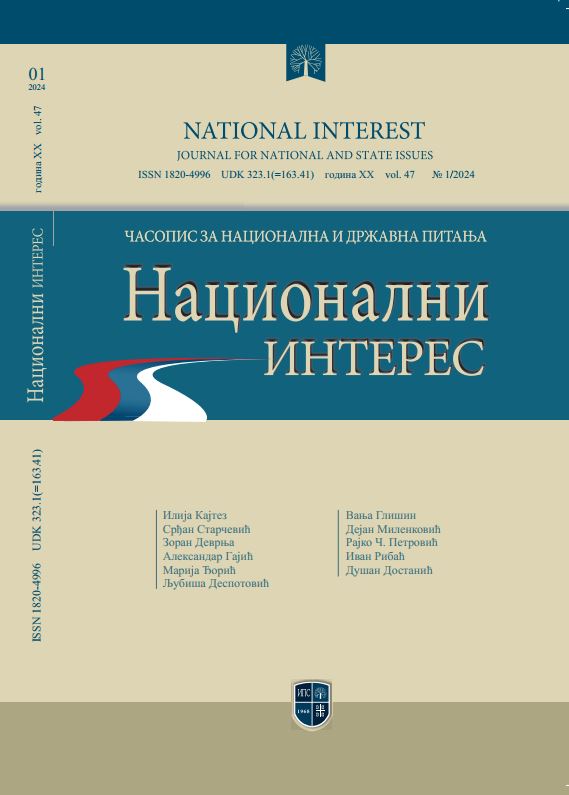RECONSIDERING HUNTINGTON: CLASH OF CIVILIZATION THEORY AND WORLD MULTIPOLARIZATION
Abstract
The Paper examines Huntington's model for understanding conflicts in contemporary international relations, according to which the cultural and religious identities of peoples are the primary causes of their mutual clashes. Starting from the basic elements of his paradigm on the “clash of civilizations”, like the concept of civilizations and their typology, the concept of conflict, their types and causes, to which the first part of the Paper is dedicated, the central part of the Paper presents a cross-section of critical reviews of Huntington's “clash of civilizations” model from the principle criticism to particular ones. After that – and bearing in mind contemporary international events and processes in the times of the “new cold war” – an attempt is made to determine whether to what extent Huntington was right, i.e. how accurate his model for understanding the conflict was, and how much it was not. Final part of the Paper is devoted to the understanding of contemporary intercivilizational relations precisely in relation to Huntington's predictions. The conclusions that arise are clear: in Huntington's model of the “clash of civilizations”, the conflicts are obviously more contentious than the civilizations themselves. The three-decade development of international relations, from the time of the end of the Cold War until today, has significantly pointed to the importance of large-scale civilizational, cultural and value groupings, although not to the degree of monolithicity and determinism as claimed by Huntington. He also quite correctly observed two tendencies: that non-Western civilizations will reject with a leaf almost all universalistic aspirations that are imposed on them against their own value frameworks, and that this will increase mutual antagonisms, but not between all civilizations and their “core states”, religious groups and ethnicities, but between “the West and the rest.” Moreover, the process of multipolarization that has begun leads the way to greater and more continuous inter-civilizational cooperation between non-Western large, medium and small powers. The success of these reconciliations and partnership projects is evidently larger if the increasingly problematic influence of the modern West, as a disruptive factor in the intercivilizational and multipolar world equation, is excluded from them.
References
Гајић, Александар. 2023.„Колико се „нови хладни рат” разликује од старог?”. Политичка ревија 1/2023, Београд: Институт за политичке студије: 71-92.
Дугин, Александр. 2015. Теория многополярного мира. Плюриверсум. Учебное пособие. Мосвка: Академический Проект.
Хантингтон, Семјуел. 1998. Сукоб цивилизација и преобликовање светског поретка. Подгорица. ЦИД.
Аsh, Timoty Garton. 2000. History of the Present. London: Penguin.
Diplo H./ISSF. 2019. “Teaching Roundtable 11-6 on The Clash of Civilizations in the IR Classroom”, 06.11.2019. https://networks.h-net.org/node/28443/discussions/5273269/h-diploissf-teaching-roundtable-11-6-clash-civilizations-ir приступљено 20.11.2023.
Еisenstadt, Shmuel. 2002. Mulitple Modernities. London: Routledge.
Elst, Koenraad. 2001. „India's Only Communalist: an Introduction to the Work of Sita Ram Goel”, Sharma, A. (2001). Hinduism and secularism: After Ayodhya. Basingstoke: Palgrave.
Erdem, Egin. 2002. “The Clash of Civilization revisited after September11”, Alternatives – Turkish Journal of International Relations, vol 1 no. 2. Merkez/Yalova: Yalova University.
Kahteran, Nevad. 2002. Perenijalna filozofija „Philosophia Perrenis”. Sarajevo: El Kalem.
Krauč, Kolin. 2014. Postdemokratija. Beograd: Karpos.
Lings, Martin, Minnaar, Clinton. 2007. The Underlying Religion: An Introduction to the Perennial Philosophy, Bloomington, Indiana: World Wisdom.
Fox, Jonathan. 2001. “Two Civilizations and Ethnic Conflict: Islam and the West Source”. Journal of Peace Research 38, no. 4. http://www.jstor.org/stable/424897. приступљено 29.11.2023.
Fukujama, Frensis. 2002. Kraj istorije i poslednji čovek, Podgorica i Banja Luka: CID i Romanov.
Henderson, Errol, Tucker Richard. 2001. “Clear and Present Strangers: The Clash of Civilizations and International Conflict.” International Studies Quarterly 45, no. 2 (June 2001), http://www.jstor.org/stable/3096113 приступљено 29.11.2023
Huntington, Samuel. 1993. „The Clash of Civilizations?”. Foreign Affairs. 72 (3): 22–49.
Klare, Michael. 2002. Resource Wars: New Landscape of Global Conflict. New York: Henry Holt.
Kesić, Dušan. 2019. „Koncept strateške kulture u studijama bezbednosti”. Godišnjak Fakulteta bezbednosti 2019/1. Beograd: Fakultet bezbednosti: 147-167.
Lewis, Bernard. 1990. „The Roots of Muslim Rage”. The Atlantic Monthly, September 1990 https://www.theatlantic.com/magazine/archive/1990/09/the-roots-of-muslim-rage/304643/ приступљено 28.11.2023.
Oprea, Anastasia.2020. „The border that is not there: a critique of Samuel Huntington's concept of „Clash of Civilizations". Cabo dos Trabalhos 1/2020. https://cabodostrabalhos.ces.uc.pt/n14/documentos/02_AnastiaOprea.pdf приступљено 28.11.2023.ž
Russett, Bruce, John, Oneal and Cox Michaelene. 2000. “Clash of Civilizations, or Realism and Liberalism Déjà Vu? Some Evidence”. Journal of Peace Research 37, no. 5 (Sep 2000), http://jpr.sagepub.com/cgi/content/abstract/37/5/583. приступљено 29.11.2023.
Said, Edward. 2001. „Clash of Ignorance”. The Nation [Online] https://www.thenation.com/article/archive/clash- ignorance приступљено 28.11.2023.
Tian, Dewen. 2022.”What’s Wrong with the “Clash of Civilizations””. China Watch Vol. 2, No. 5, February 2022: 1-8.
Tusicisny, Andrej. 2004. “Civilizational Conflicts: More Frequent, Longer, and Bloodier?”. Journal of Peace Research 41, no. 4 (July 2004), http://www.jstor.org/stable/4149685 приступљено 29.11.2023.

